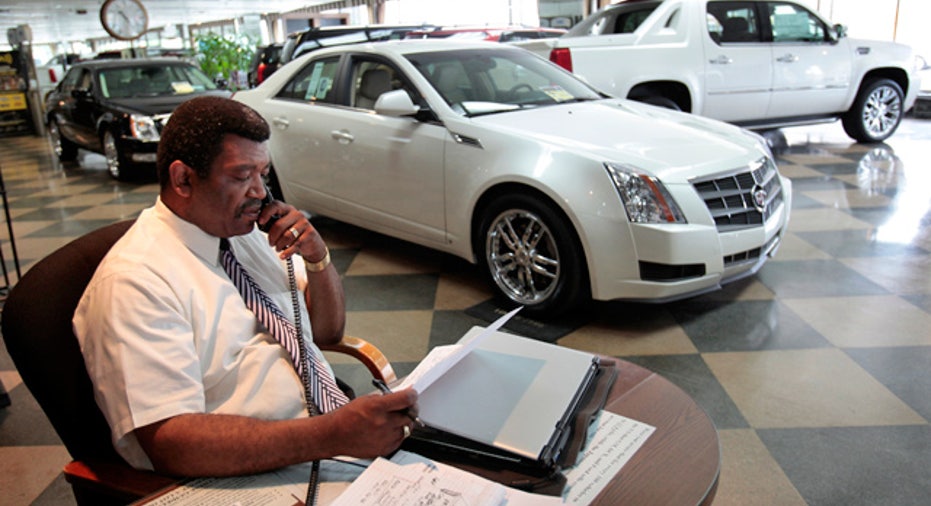5 Ways to Trim a Subprime Car Loan Rate

Despite the stigma of the word "subprime" when it's attached to any kind of loan, subprime car loans are on the upswing as a share of overall auto financing, says Melinda Zabritski, director of automotive credit at the credit reporting bureau Experian.
A subprime car loan is for a buyer with a low credit score and a spotty credit history. As a percentage of total automotive financing, such loans represented almost 20% of all new-vehicle financing in 2010 from almost 17% in 2009, according to Experian. For Experian, a credit score of 670 or lower is considered subprime.
Steven Bowman, chief credit and risk officer at GM Financial, the financing arm for General Motors, says there isn't much a consumer can do to significantly raise a credit score while negotiating with a dealer's financing manager.
"It's (done) over time and not a quick process," he says.
Still, there are steps you can take in the short term to increase your chances of snagging financing and perhaps lowering the cost of a subprime car loan, even as you confront a lousy credit history.
Obtain Your Credit Score
A key factor in determining creditworthiness and establishing a rate, your credit score is a snapshot of your credit status. Good or bad, it is information you should have before you go car shopping because even for consumers with good credit, their credit score can influence their rate.
You can obtain your credit score through any number of online sites. Some sources offer your score for free as a come-on for other consumer-finance services and others charge a small fee, usually $10 or less. The three national credit reporting bureaus -- Experian, TransUnion and Equifax -- provide credit scores and are a good place to begin your search.
Aquire Your Credit Report
A credit score and credit report are two different pieces of evidence a creditor will scrutinize when considering a financing application. If your credit score is a snapshot of your creditworthiness, your credit report is its history.
Credit bureaus report the information creditors provide, which isn't always correct. A consumer has the right to dispute any piece of information appearing on a credit report and should challenge anything that is incorrect. This is particularly true for someone seeking a subprime car loan and who needs to reduce the negative information on his or her credit report.
Moreover, each credit bureau issues its own report and these may differ from one another. Rod Griffin, Experian's director of public education, suggests obtaining your report in advance of applying for financing to give yourself time to dispute any inaccuracies.
Once you know your credit situation, you can begin to look for ways to improve it. "You need to know exactly what your credit report says," he says.
Why are You a Credit Risk?
Griffin says a consumer considered for a subprime car loan typically has one or more of the following:
- Substantial problems with debt management.
- Accounts in collection.
- Home or car repossession.
- Bankruptcy.
Review your credit report to determine if any negative items are fixable in the short term.
Are there any small balances reported by collection agencies that you might be able to pay off or delinquent credit card payments that you can bring up to date?
Let the lender see that you have made a serious effort. "The biggest thing to do (to enhance your approval chances) is to improve your overall credit profile," Bowman says.
Make a Generous Down Payment
Someone strapped for cash with damaged credit might find it nearly impossible to make a large down payment, but doing so will significantly improve the chances of approval of a car loan and perhaps move you from a subprime car loan rate to a better loan rate. Whether it's with cash or equity in a trade-in, a down payment of 20% or more will improve your profile with a lender.
"The higher the down payment, the better the chance of approval," Bowman says. "Cash is looked at more favorably than a trade-down." A trade-down is when you trade in a car and put some equity value toward a new car loan down payment.
Gather All of Your Documentation
According to Bowman, a lender is more likely to look favorably upon an applicant who has all of the required documentation in order. Doing so won't balance out a bankruptcy or miraculously elevate you from subprime car loan status, but making a lender's job easier places the applicant in a better light. It also saves time during the application process. He says that the documents most likely to be required are:
- A current driver's license.
- A current utility bill.
- A recent pay stub.
Bowman cautions against making any statements to the lender that aren't supported by the documents, such as exaggerating your income. Be honest and truthful.
"Most subprime lenders do a more intense due diligence," he says. "Be upfront. Know that everything is going to be verified."



















